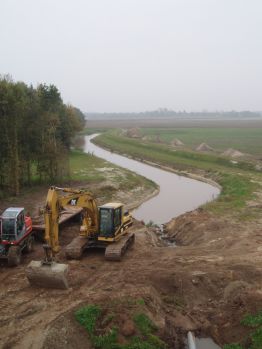Project Aim
There are two main objectives of the project. On the one hand, it aims to increase cooperation between all interested parties in management of river corridors, i.e. identify appropriate bodies and individuals undertaking the work, elaborate mechanisms for them to meet, reach consensus, and exercise control over the development of the river corridors. On the other hand, the aim is to demonstrate, in a practical way, how to apply an integrated management strategy through a series of projects in each of the partner-led areas.
Project implementation and results
Sustainability
SPARC stands for the overarching project work focuses on setting up mechanisms for establishing local partnerships and engaging communities in the development of rivers and their corridors. The project has by its 'SPARC' philosophy and its river management programmes in the five participating countries encouraged bio-diversity, addressed the problem of flooding, preserved heritage and seized the opportunity to establish local economic development as an asset to conservation.
Leverage of extra investment
Some SPARC-related projects have attracted new investment, others a steady income from visitors, which has led to the creation of employment and a financially secure and stable future for the continuing conservation of the water-dependent environment.
Joint transnational strategy
The project has been using earlier project approaches and results from the former North Sea Region project PURE. In support of objective 1, approaches were developed through a formalised process of project appraisal and trans-national learning known as the SPARC check. The same SPARC check approach has been taken forward again for use within the Waterline Economy project within the IIIB North Sea Programme.
Impact of the project
Long-term achievements and policy shaping
The project has also corresponded to the third major piece of European legislation in terms of the Water Framework Directive. For instance, the creation of wetland along the river corridor of the River Halkær in Denmark has helped purify the water, while the construction of a river-off 'collection' lake filters out further nutrients. The project has thus met the requirements of both the Habitats Directive and the Water Framework Directive, providing habitat flora and fauna, while creating cleaner water.
The project results will also help shaping future policies and planning guidance. For instance, River Nene Regionl Park (RNRP) green infrastructure GI Suite has been formally adopted in the North Northants core spatial strategy (and shortly in West Northamptonshire). In the Netherlands, the Runde strategic river management plan is now part of the planning guidance for municipalities and provinces and in Aalborg, Denmark, the results form part of municipal planning for rural areas. |

Development of river corridors, excavation
Partners North Jutland County Council, DK
City of Langenhagen, DE
Province of Drenthe, NL
Ringkjøbing County Council, DK
West Sweden / District Administration of Gunnared, SE
Vrije Universiteit Amsterdam, Institute for Geo- and Bioarchaeology, NL
LP:
Environment Agency, Midlands Regional Office
Project Manager
Tim Pickering
Environment Agency, Midlands Regional Office Sapphire East, 550 Streetsbrook Road
B91 1QT Solihull
United Kingdom
tim.pickering@environment-agency.gov.uk
www.sparc-project.org
Tel: +44 121 711 5914
Measure: 4.1
Start Date: 18 May 2005
End Date: 31 March 2008
ERDF Grant:
 1.493.900,00 1.493.900,00
Total Eligible Sum:
 2.987.800,00 2.987.800,00
|